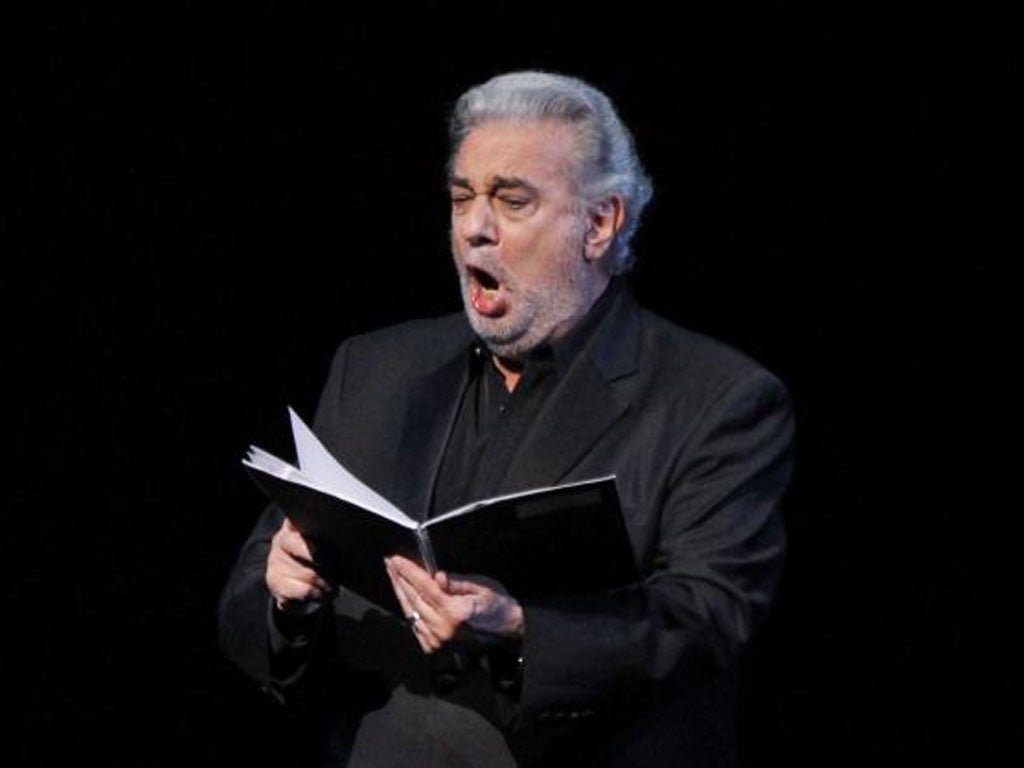Plácido Domingo's Operalia Winners, Royal Opera House, London

Your support helps us to tell the story
From reproductive rights to climate change to Big Tech, The Independent is on the ground when the story is developing. Whether it's investigating the financials of Elon Musk's pro-Trump PAC or producing our latest documentary, 'The A Word', which shines a light on the American women fighting for reproductive rights, we know how important it is to parse out the facts from the messaging.
At such a critical moment in US history, we need reporters on the ground. Your donation allows us to keep sending journalists to speak to both sides of the story.
The Independent is trusted by Americans across the entire political spectrum. And unlike many other quality news outlets, we choose not to lock Americans out of our reporting and analysis with paywalls. We believe quality journalism should be available to everyone, paid for by those who can afford it.
Your support makes all the difference.Opera isn’t really Olympic, because a prize is just the start. A great singer grows, matures, transforms – and three generations of vocal giants arrived at Covent Garden, ready to prove it.
Seven of today’s brightest stars (it should have been eight, but Erwin Schrott was ill), all prizewinners at Operalia, the singing competition that Plácido Domingo founded 20 years ago, combined forces for a grand celebration together with Domingo himself. Now London 2012 can indeed claim a once-in-a-lifetime experience for its festival.
Nina Stemme, the Swedish soprano who triumphed in the first Operalia in 1993, gave us Wagner: Sieglinde to Domingo’s Siegmund in a brief extract from Die Walküre, and showing in ‘Dich, teure halle’ from Tannhäuser how far her voice has travelled. This power was a taste of what she can now do as Brünnhilde. Yet she won Operalia as a mezzo-soprano. That’s some journey.
Then there’s Joseph Calleja, the Maltese tenor. If Covent Garden wanted to generate its own electricity, it need only hook up some wires to him. His rock-solid yet ever-malleable voice and blazing stage presence could light a thousand lamps. He and Domingo together offered the duet from The Pearl Fishers; and later, to him fell the task of singing ‘Nessun Dorma’. Will he inherit the Domingo torch? I wouldn’t put anything past a voice like that.
He could have stolen the show, but that would have been impossible with Joyce DiDonato about: that golden-girl artist matched him quality for quality. Wrapped in a chiffon gown worthy of Tate Modern, the American mezzo-soprano started with an extract from Rossini’s La donna del lago, ‘Tanti affeti’, a bel canto virtuoso glory that we rarely hear, probably because it’s too difficult.
The most recent winners hit the spotlights in 2010: the young Romanian Stephan Pop, and Sonya Yoncheva, a Bulgarian soprano. If Pop’s ‘Che gelida manina’ was a little wobbleful, he proved in ‘La donn’e mobile’ that his vocal colour can cut the mustard, or will soon. But Yoncheva oozes star quality, with a dusky and sensual performance of the aria “Depuis le jour” from Charpentier’s Louise. “Je suis hereuse,” sings the heroine. Happy? So were we. And Julia Novikova, the Russian soprano (a winner in 2009) who recently starred with Domingo in an internationally televised Rigoletto, has a near-magical vulnerability with which, rather than belting at the audience, she draws them in towards her.
Rolando Villazón brought ‘Kleinzach’ from Offenbach’s Les contes d’Hoffmann: the wild imagination, the clowning about, the eyebrows, the works. He calmed down for his duet with DiDonato from Bellini’s I Capuleti e i Montecchi. But in full flood, even if you feel he just needs to keep still for half a second, you can’t help loving that man.
Domingo, at 71, remains incomparable. If the voice has lost some bloom, its character is wholly intact. His one solo, ‘Nemico della patria’ from Giordano’s Andrea Chenier was a heart-rending highlight. And the father-and-daughter duet from Rigoletto, with Novikova, saw him not so much performing as becoming the character. He, of all people, has proved that an opera singer can indeed change the world.
For encore, the entire team, plus the ROH’s young bass Jihoon Kim, sang the sextet from Lucia di Lammermoor, doubling up here and there. It was that kind of evening: all hands on deck, with Tony Pappano himself singing in conversation with Villazón’s Hoffmann, and Calleja and Yoncheva fizzing through an unanticipated scene from L’elisir d’amore to replace a Schrott number.
And to start? The overture to Die Meistersinger von Nürnberg, of course – an opera about a singing competition. Covent Garden’s new acoustic shell for concerts rendered the sound rich and warm; and the Orchestra of the Royal Opera House’s magnificent playing was the nearest we got to a team GB. No Brit has yet won a top prize at Operalia. That’s another issue.
Join our commenting forum
Join thought-provoking conversations, follow other Independent readers and see their replies
Comments